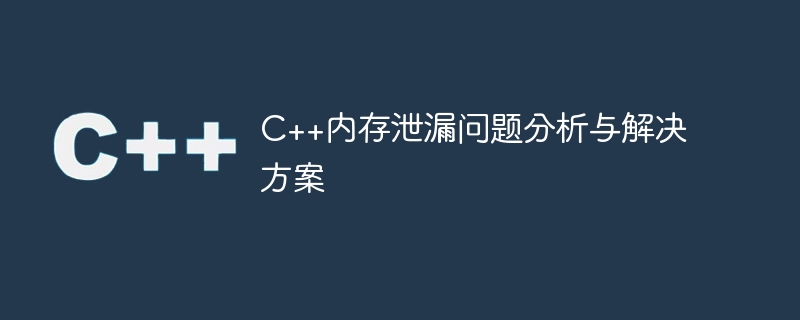

C Memory leak problem analysis and solution
In the development process of C, memory leak is a common problem. When a program dynamically allocates memory but does not release it correctly, memory will continue to accumulate while the program is running, eventually exhausting the system's available memory. Memory leaks will not only affect the performance of the program, but may also cause the program to crash or even the system to crash. Therefore, it is very important to detect and solve memory leak problems in time.
Below, we will discuss the C memory leak problem from three aspects: analyzing the causes of memory leaks, tools to find memory leaks, and methods to solve memory leaks.
1. Causes of memory leaks
2. Tools for finding memory leaks
3. Methods to solve memory leaks
A sample code is given below:
class Resource { public: Resource() : data(new int[10]) { // 构造函数分配内存 } ~Resource() { delete[] data; // 析构函数释放内存 } private: int* data; };
By using the RAII principle, when the Resource object is created, the constructor allocates memory for data. When the object is destroyed, the analysis The constructor releases the memory.
A sample code is given below:
#includevoid function() { std::shared_ptr p(new int); // 使用shared_ptr分配内存 // 不需要手动释放内存,当p超出作用域时自动释放 }
By using smart pointers, memory management can be simplified and the possibility of memory leaks can be reduced.
Summary: Memory leaks are a common problem in the C development process. In order to avoid memory leaks, we should be familiar with the causes of memory leaks, use appropriate tools to detect memory leaks, and take appropriate solutions. RAII principles, smart pointers, and reasonable use of standard library containers are effective ways to solve memory leak problems. Through these methods, the stability and performance of the program can be improved and problems caused by memory leaks can be reduced.
The above is the detailed content of C++ memory leak problem analysis and solutions. For more information, please follow other related articles on the PHP Chinese website!
 What are the differences between c++ and c language
What are the differences between c++ and c language Recommended learning order for c++ and python
Recommended learning order for c++ and python Cost-effectiveness analysis of learning python and c++
Cost-effectiveness analysis of learning python and c++ Is c language the same as c++?
Is c language the same as c++? Which is better to learn first, c language or c++?
Which is better to learn first, c language or c++? The difference and connection between c language and c++
The difference and connection between c language and c++ C++ software Chinese change tutorial
C++ software Chinese change tutorial Cost-effectiveness analysis of learning python, java and c++
Cost-effectiveness analysis of learning python, java and c++



